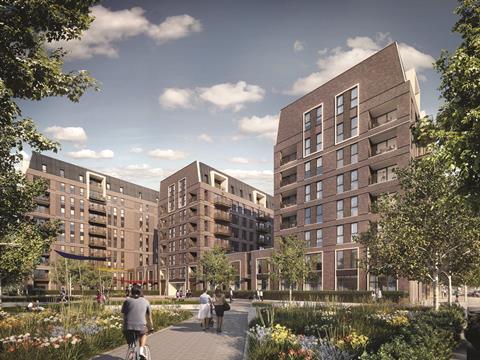It is no secret that Countryside Partnerships was fighting an uphill battle last year.

In the 12 months preceding its takeover by fellow housebuilder Vistry Group last November, Countryside’s sales were sluggish compared with its competitors, its stock market value almost halved and it faced pressure from activist investors to sell. With the pressure firmly on, a discounted £1.25bn deal with Vistry appeared to be a sensible result.
Speaking six months on from the conclusion of the deal, Stephen Teagle, who led Vistry Partnerships since 2020 and became chief executive of Countryside last year, says the merger has been “a very successful, transformational process for Countryside”, adding that the deal has established a platform of 19 businesses, spanning an area “from Penzance to Newcastle”.
Now it has the larger resources of Vistry behind it, Teagle even believes Countryside could develop 20,000 homes a year, making it “the largest housebuilder in the country”. Barratt Developments currently occupies the number-one spot, developing around 18,000 properties a year.
The merger has brought a range of benefits, Teagle argues, including giving both Countryside and Vistry access to knowledge and experience they previously did not hold individually and enhancing connections with key industry organisations.
“Countryside had a stronger relationship with the GLA [Greater London Authority] compared with Vistry and, conversely, Vistry has a stronger relationship with Homes England.
“Both had significant strategic land positions, so by combining their strengths in our strategic land, planning and sales and marketing teams, we captured benefits for the group in terms of how we have embedded a consistent infrastructure across the grid.”
It’s been a very successful, transformational process for Countryside
The merger has also given the organisations insight into growing markets such as the later-living sector. “Vistry delivered 50 to 60 extra-care schemes and retirement villages,” says Teagle. “It’s an area where Countryside has not particularly had a footprint, so that’s an advantage.”
The merger has had an impact on headcount. Teagle doesn’t say how many roles have been lost at Countryside, but concedes that “regrettably” there have been redundancies, which he says are partly down to “synergy savings” as well as efficiencies within the supply chain.
In what seems like a perfect storm of rising inflation, build costs and political uncertainty, most large UK housebuilders have predicted a challenging year ahead, in terms of completions and sales. But Teagle says the year started on a positive note.
More confidence
“We’ve seen improved consumer confidence since the last quarter of 2022,” he says. “We’ve seen more stability in the economy and an improved level of confidence into this year. Yes, we’re using some incentives to get sales, but pricing has been really firm.”
The housing market remains particularly challenging for first- time buyers, who are struggling to find affordable mortgages amid rising living costs. Teagle acknowledges that first-time buyers “remain under enormous pressure” and need support to gain a foot on the property ladder.
“With the removal of Help to Buy, there is no doubt the whole industry, sector and nation needs to consider what we are doing to support first-time buyers and new household formations,” he says.
Since the end of the government-backed scheme, Teagle notes there has been a growing demand for one vital method to get buyers on the property ladder: shared ownership.
“Talking with our housing association partners, the demand for shared ownership is even stronger, with an increase in the first tranche percentage sales that is associated with potential customers coming from Help to Buy over to shared ownership.”

Teagle also notes “mortgage rates trending downwards”, with many customers being informed by “commentators highlighting the fact that it’s cheaper than renting”.
Despite a positive outlook on the market and the fact that Countryside has “seen the highest level of sales we’ve had all year”, Teagle says the outlook remains uncertain. “The planning and political environments remain challenging,” he says. “We’d like to see that get better, but we’re a little bit concerned that’s going to get worse in the short term.”
Again, he emphasises the need for more government support. “I’d like to see government policy focus on supporting first-time buyers,” he says. “It’s very important that we increase the delivery of affordable rented homes.
“We also need to address the deepest and largest queue for UK housing, which is the intermediate market. That market needs support for aspiring homeowners through shared ownership or interventions like Help to Buy that used to support that delivery.”
Modern methods of construction (MMC) are often seen as another way to cut housing queues by speeding up development. Countryside owns MMC factories in Warrington, Narborough and Barden, and had planned to close the latter before the merger, but has now reversed that decision.
Teagle believes MMC will not only be integral to helping Countryside hit its ambitious housing targets, but will support other housing developers, too. “We want to work with like-minded large housing associations,” he says. “Our commitment to delivery through factories is fundamental. It’s something that is informing how we go forward as a business.”
He believes the merged company is well placed to make MMC work at scale and make a difference across the industry. “Having been involved in offsite manufacturing over 25 years ago, this is the first significant opportunity I’ve seen in the sector to make that happen,” he says.
From factory to site
Teagle cites Countryside’s scheme in Warrington as an example of its use of MMC. The site was bought for more than £100m through a joint venture with Torus Developments. The JV aims to develop 1,200 homes, comprising private sector rented and affordable housing. Teagle says it will be providing “homes to the site from our factory”.
He adds: “It’s a win for the local authority in terms of its housing supply, and for national government in terms of increased housing supply and the use of MMC, both of which are proposed by the government. The site encapsulates a lot of the advantages we have as a group.”
When asked about Countryside’s priorities following the merger, Teagle says environmental, social and governance (ESG) issues are high on the agenda. “It’s fair to say Countryside had a more visible ESG commitment than we had in Vistry,” he says. “But by bringing the two together, we will get even more outputs, which is great. We’re doing a review of our materiality assessment during the year, and will be setting new targets. So, watch this space as we’ve already captured some wonderful outputs from ESG.”
Countryside has also produced a decarbonisation strategy that outlines how it aims to cut its direct emissions alongside its roadmap to net zero carbon homes.
In the past year, Countryside has endured its fair share of challenges and turmoil, but Teagle is pleased by the progress made since the merger and remains optimistic about what can be achieved. With Vistry’s support, Teagle claims that not only can Countryside raise its output but help “refresh neighbourhoods and provide high levels of social value output”.
He concludes: “That’s the characteristic of what we can achieve with this large partnerships business: not just our commercial success but creating great places and building homes that really have embedded quality.”
Countryside: owners through the years
1958: Countryside is founded by Alan Cherry. He remained chairman until his death in 2010.
1972: It acquires developer Copthorn and the combined firm is floated on the London Stock Exchange.
2005: The firm is taken private again and bought out by Copthorn Holdings, which is jointly owned by the Cherry family and Lloyds Banking Group.
2009: Lloyds takes control of the firm after the financial crisis affects housebuilders.
2013: Oaktree Capital Management purchases a majority share.
2016: Countryside floats on the London Stock Exchange for a second time.
2022: Countryside becomes the subject of several takeover bids following a difficult trading period. Shareholders agree to a £1.24bn cash-and-shares deal with Vistry Group.






























No comments yet